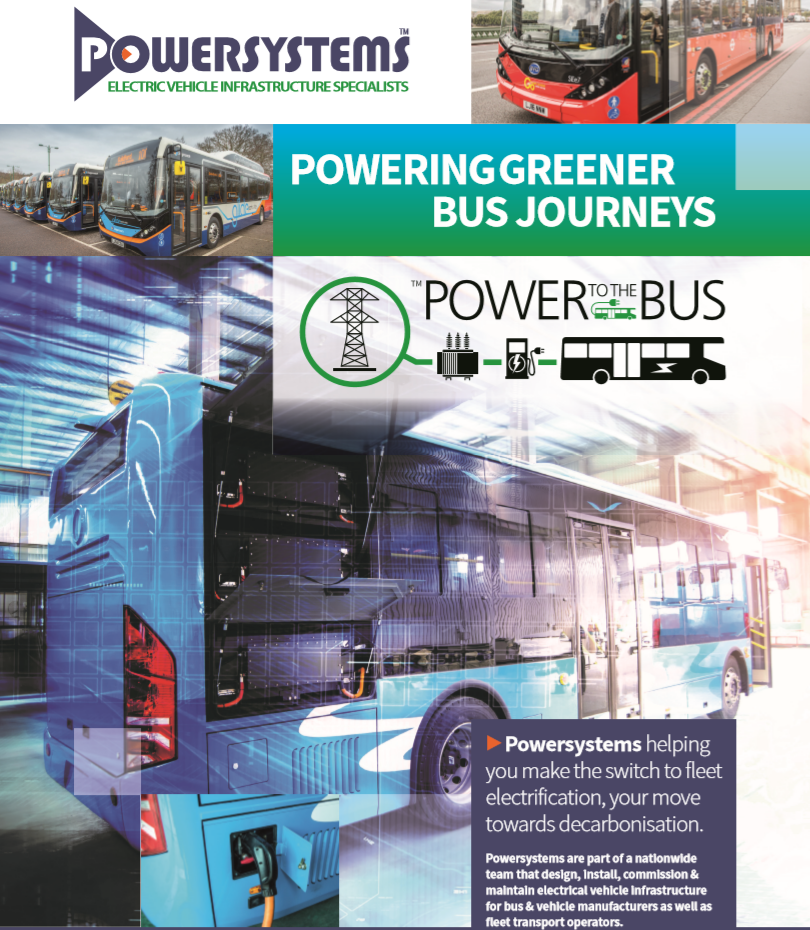Powersystems have created an easy to read guide to grid connection for Bus and Fleet Electric Vehicle (EV) infrastructure and explains the most important steps you need to undertake before you start to scope out your project.
Securing grid capacity for your electric vehicle, bus, van or fleet project is of paramount importance, even before proceeding with vehicle procurement.
Historically most bus garage sites are generally connected to the distribution system at LV (Low Voltage 415 v three phase), it is unusual to find a site with in excess of a 250 kva supply capacity, as generally these sites load characteristics would only cater for lighting, workshop power, MOT test bays and vehicle washes etc. The transformation from diesel buses to all electric can be a complicated process for a garage infrastructure and failure to secure grid capacity can lead operators to the exposure of potentially high and in cases up to six figure connection costs.
Traditionally an electricity board would have provided connection services to a customers premises, however in the mid-90s under OFGEM regulations, the connection monopolies were removed and with the transition to Regional Electricity Companies and now Distribution Network Operators, the regulator encouraged the competition in connection regulations and now managed under an Accredited Contractors Scheme by Lloyds Register.
This brought Independent Connection Provides (ICPs) who could now once accredited, design, manage, install, test and commission new supply grid connection assets under this scheme (Powersystems were the first contractor in the UK to attain this status), which at last brought competition into the electricity connections market.
The advantages of engaging an ICP to manage all aspects of your connection will have commercial cost advantages, in that they will be to a degree risk adverse, work to agreed timescales and on a contracted basis (often accepting contract damages for failure to meet agreed deadlines) and to a fixed price. The Commercial benefit for a customer or operator is that agreed payment milestones would also be agreed, allowing clients to manage cap-ex and cash flow throughout all stages of the project.
As an ICP, Powersystems can guide a customer or operator through the grid application process, or indeed handle this on a client’s behalf. It is important that a customers site is subjected to a site capacity survey, a service Powersystems carry out as a free of charge service, advice on can the DNO network support additional capacity, upgrading of existing HV/LV installations if possible, advise on time frames to deliver the project, engagement with other external stakeholders such as Local Council Highways, Network Rail, Transport for London (TFL) all essential for grid route planning.
An ICP would be able to carry out all the normal functions a DNO will offer to include but not limited to:
Design, project management, cable laying, cable jointing, substation installation for equipment and networks from LV up to voltage levels of 132,000v. As well as all associated civil engineering works including excavation, cable laying and back filling.
An ICP will be able to engage on a customer’s behalf an IDNO (Independent Distribution Network Operator) to adopt the newly connected infrastructure, as opposed to paying for a new supply upgrade to a DNO where they retain and adopt the new connection at the customers expense. If an IDNO is engaged in lieu of the DNO they will still operate in exactly the same way, except the customer will be paid an asset adoption value which will offset their connection cost in the first instance.
For more information call our EV Infrastructure specialists on 01454 318 000
Notes to Editors:
Contact Information:
- This article is written by Jules Daly, Marketing and Communications Manager at Powersystems UK.
- Email jules.daly@powersystemsuk.com Telephone 01454 318000
- Photography Copyright please credit all images used to powersystemsuk.co.uk
Powersystems are powering the transition to a carbon free future
As a high voltage specialist electrical engineering company with over 45 years (1977-2022) experience Powersystems have grown by reputation to become a trusted force in the design, installation and commissioning of electrical infrastructure across the UK.
Celebrating 25 years as the first Lloyds National Electricity Registration Scheme ‘s accredited Independent Connection Provider (ICP), Powersystems are capable of delivering contestable grid connections at voltages up to 132 kV.
Since 2000, Powersystems have connected over 6 Gigawatts of renewable energy generation to the UK electricity grid, along with decarbonisation technology which includes; wind energy projects, solar, anaerobic digestion, hydroelectric, electrical vehicle infrastructure, short term operating reserve STOR, combined heat and power (CHP), Grid stability projects like rotating stabilisers, and battery energy storage systems (BESS) as well as commercial industrial private wire networks.
Working with partners, delivering sustainable power solutions, proudly the Powersystems high voltage specialist team have connected 27% of all U.K. onshore wind farm
At the core of the operation is a commitment to the highest values of health and safety, welfare, quality and the environment. Powersystems Integrated management systems are ISO accredited and their approach under their health and safety ‘Priority No.1’ brand is to aim for the best industry practice in all.
Powersystems UK Ltd. is an Employee-Owned Business and as such has a keen interest in the well-being of all its employees. They encourage and empower you to be imaginative, share great ideas and be involved in the success of the business.
Speak to Powersystems today
You can contact us as follows

